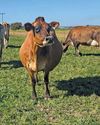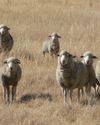Intentar ORO - Gratis
Rebuilding a livestock enterprise after a drought
Farmer's Weekly
|May 08, 2020
In this article, Dr Louis du Pisani, national manager for production advice and development at the National Wool Growers’ Association, explains how to carry out post-drought recovery and reconstruction of a livestock enterprise to achieve optimal, lasting results.

Drought, especially if prolonged, leads to a decline in veld condition, livestock numbers, and the financial situation of a livestock enterprise. Once the drought breaks, the livestock farmer faces a burning question: what are the best practices for repairing drought damage and rebuilding the farm to its former level of productivity?
But before answering this, the farmer has to answer another question: which comes first, the veld, the livestock, or the finances? The answer is that all three should be repaired simultaneously as they are interdependent. But implementation is not that simple.
RECOMMENDATIONS
The following should be borne in mind when carrying out the recovery and rebuilding process:
• A drought-stricken farm, like a patient in an intensive care unit (ICU), needs treatment that produces positive results from the start. There is no time for experimenting or taking risky decisions. The right medicine is often bitter, but essential.
• Seek the advice of a multidisciplinary team consisting of experts in grazing management, animal husbandry and agricultural economy. This team should determine the condition of the farming concern in the ICU and develop a comprehensive turnaround strategy. It is all well and good to hope, but hope on its own is akin to gambling.
• Base all decisions on a sound plan and good judgment. A clear head and self-discipline are also crucial. Sentiment, poor farming practices, emotion, and impulsiveness should be avoided at all costs. • Remember that there are no quick fixes; the process takes time
• Focus fully on the turnaround strategy during the repair and reconstruction process and make timely adjustments when necessary.
Esta historia es de la edición May 08, 2020 de Farmer's Weekly.
Suscríbete a Magzter GOLD para acceder a miles de historias premium seleccionadas y a más de 9000 revistas y periódicos.
¿Ya eres suscriptor? Iniciar sesión
MÁS HISTORIAS DE Farmer's Weekly
Farmer's Weekly
Farmers 'unilateral victims' of climate
Gyeongbuk Provincial Council member Choi Taerim has demanded immediate and substantial support for apple farmers in the South Korean province, urging immediate measures for apple farmers affected by heat damage be implemented, The Asia Business Daily recently reported.
1 min
November 21-28, 2025

Farmer's Weekly
Top agri workers celebrated in the Western Cape
Shannon Robertson, assistant livestock manager at Boschendal near Franschhoek, was crowned the overall winner of the 2025 Western Cape Prestige Agri Awards, held in Durbanville.
1 min
November 21-28, 2025

Farmer's Weekly
Smart dairying: running Jerseys on pasture
The dairy farming sector has seen innovation in milk parlour and cow comfort technology that have allowed farmers to not only yield higher volumes, but extend the productive lifespan of their cows. Albrecht de Jager told Henning Naudé about his approach to maintaining a pasture-raised Jersey herd while utilising precise data measuring technology to ensure quality milk output and optimal cow comfort.
6 mins
November 21-28, 2025

Farmer's Weekly
High-performance dairy farming in the Eastern Cape: the Rufus Dreyer approach
Dairy farming is often described as one of the most technically demanding and strategically complex branches of agriculture.
6 mins
November 21-28, 2025

Farmer's Weekly
Design your stables and camps to assist in AHS control
Keep horses away from areas where disease-carrying midges multiply, like natural pools, lakes, streams and dams, advises Dr Mac.
2 mins
November 21-28, 2025

Farmer's Weekly
The rolling chant that has echoed through SA over the past 30 years
Johan van der Nest is renowned in auction circles and was the first freelance stud-stock auctioneer to begin operating in South Africa.
10 mins
November 21-28, 2025

Farmer's Weekly
Flight from the Red Army
The fall of the Third Reich in 1945 was defined by the Red Army's brutal invasion of Germany. Mike Burgess tells how the Hoppe family trekked from Finowfurt near Berlin to Preetz in Schleswig-Holstein to escape the brutality.
6 mins
November 21-28, 2025

Farmer's Weekly
How to plan a pre-sale feeding programme
Proper feeding of animals before a sale can help producers catch the eye of buyers and increase profits, but it is important to choose the right ration.
8 mins
November 21-28, 2025

Farmer's Weekly
How women are transforming coffee production in Kenya
A group of Kenyan smallholder women farmers are transforming the country's high-value coffee sector by pooling their resources.
5 mins
November 21-28, 2025

Farmer's Weekly
Tough times ahead for SA's grain farmers
Grain farmers face a difficult year ahead with lower grain prices and high production costs
3 mins
November 21-28, 2025
Translate
Change font size
